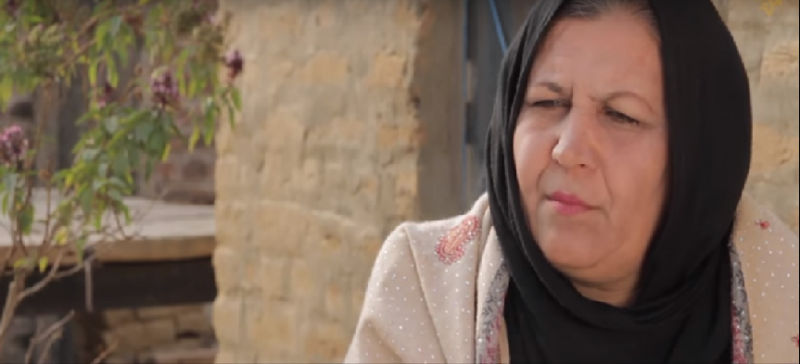
Aqeela Asifi speaks about her journey. Image: Varkey Foundation Global Teacher Prize / YouTube
Imagine teaching for 23 years in a small Afghan refugee camp at Kot Chandana village, on the outskirts of the Punjab province in Pakistan, and then, one day, learning that Stephen Hawking himself has lauded you and your work. Aqeela Asifi—one of the top ten finalists for this year's Global Teacher Prize—knows this feeling. In a video posted on the contest's Facebook page, Professor Hawking announced this year's finalists, and Asifi is among them.
The competition's website says the prize is awarded every year to a truly exceptional educator:
The Global Teacher Prize is a US $1 million award presented annually to an exceptional teacher who has made an outstanding contribution to their profession. The prize serves to underline the importance of educators and the fact that, throughout the world, their efforts deserve to be recognised and celebrated.
Asifi’s life in Afghanistan was relatively simple. She belonged to a family that supported her right to education, despite cultural challenges. She was content with her career as a teacher in Kabul, until the Taliban took power, making it impossible to continue her work. Asifi and her family found sanctuary in Pakistan in 1999, hoping for a better and safer future.
It was in an Afghan refugee camp that she began her brave and tireless struggle to educate Afghan refugee girls. It proved to be no easy task, and Asifi soon realized she was dealing with people who had no concept of a right to education for girls. In an interview with the organizers of the Global Teacher Prize, Asifi summed up her journey:
When I asked the girls why they were going absent from school, they said girls are not supposed to go to school.
Relentless, Asifi established a small classroom in the refugee camp, where she's now been teaching for years, receiving multiple awards for her work. She's been on the job so long already that she's even begun educating the daughters of her first generation of students:
The girls I taught 20 years ago now send their daughters to my school, so I’m teaching the second generation of my students.
Lili Mao, a graduate student in the Television Management Department at Drexel University, traveled to Pakistan last December to film Asifi at work with Afghan girls. Mao says she witnessed the girls’ eagerness to get an education, she told her university's newspaper:
I interviewed some girls at their school, and they shared their dreams with me. One girl said that she wanted to be a teacher, so that she could teach other refugee girls like Asifi. Another girl said that she wanted to be a doctor to serve her country.
Pakistan's Nobel Laureate Malala Yousafzai, prominent for promoting the universal right to education, also contacted Asifi, congratulating her over the phone on being among the finalists for the Global Teacher Prize. Malala Yousafzai’s father, Ziauddin Yousafzai, also conveyed his best wishes to Asifi over Twitter:
Malala & I congratulated Aqeela finalist for Global Teachers Award & for her education work https://t.co/HFBWbR3aT5 pic.twitter.com/ehs1lbaBrV
— Ziauddin Yousafzai (@ZiauddinY) February 19, 2016
This is not the first time Asifi has been recognized for her work. In 2015, she was presented with the United Nations High Commissioner for Refugees’ Nansen Refugee Award.
Astoundingly, Asifi is now running nine different schools with approximately 900 students.
Internet users throughout Pakistan have welcomed her nomination warmly:
I am inspired to meet Aqeela Asifi, a brave and tireless champion of education for Afghan girl #refugees in #Pakistan.
— Illango (@Illango_WB) February 9, 2016
@defencepk
a PAKISTANI teacher in Stephen Hawking's TOP TEN Global Teacher Prize.
congrats Aqeela Asifi. https://t.co/5eKl0OTLJm— Sardar Abbas Aziz (@SardarAbbasAziz) February 20, 2016
Congratulations to Aqeela Asifi for making it to the top 10 finalists of the Global Teachers Prize. pic.twitter.com/sqoazjVt2W
— Duniya Aslam Khan (@DuniyaAKhan) February 17, 2016
Proud to have super women like Aqeela Asifi .More power to such people. <3 https://t.co/gbg1hz1Fob
— Sanna Ejaz ( سیاله ) (@sanaejaz2) February 21, 2016
Pakistan's Aqeela Asifi makes it to the final of the Global Teacher Prize. https://t.co/EPB782sBUg
— Bina Shah (@BinaShah) February 19, 2016
The other finalists, selected from some 8,000 applicants, include teachers from Palestine, India, the United States and United Kingdom, Kenya, Finland, Australia, and Japan. The Global Education and Skills Forum will announce the competition's winner on March 13, 2016, in Dubai. Whatever the outcome, Asifi has already won many hearts with her work in education, and she's far from finished.







3 comments